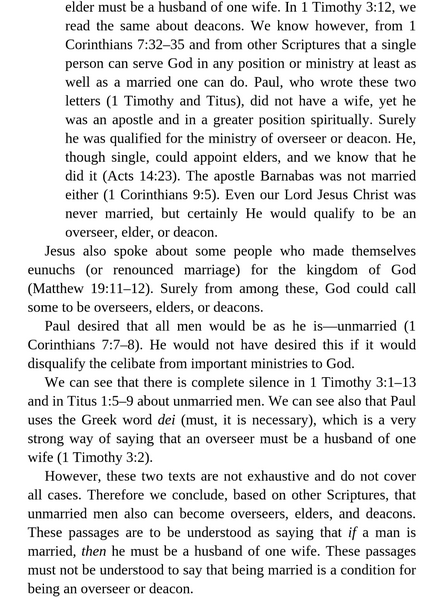The Qualities are Indicative, not Restrictive
No, being married with children is not a prerequisite for being a Bishop/Pastor. The position of a Bishop or overseer is held by an elder. Elders are appointed as overseer, Titus 1:5-7. Hence, it is natural that you will find those recruits would be fathers.
Paul also taught that being single is even better, 1 Cor 7:8; and since an overseer is a slave of God, the rule applies to him as well. If an apostle can be unmarried, so can a pastor. There is no indication that he must not be an unmarried old man, as a rule. To think otherwise is to read between the lines. Some Winstons and Winston comments that "Prerequisites for holding church office are intended to be interpreted as indicative not restrictive". The instruction indicates the candidate is masculine & a father; only because it's a general language of general statements. The reason why we exclude females as overseers is only because we have explicit commands and the long history of scriptural tradition about it. In the same way we include the unmarried candidate because we have an explicit instruction that it is good to remain single, for the service of God, being celibate is the ideal, then why would he exclude them as pastors and deacons? We also know some men live as eunuchs or celibate for the Kingdom of God- Matt 19:12, and nothing can exclude them to from the leadership position.
I thought just the name of Paul would be sufficient to answer the question conclusively; if Paul can be a leader of the Church, then any unmarried man. The questioner really assumes there is some hidden characteristic difference in leadership for a missionary than that of a church leader; however the qualification instructions are not exclusive for the leader/overseer, but the same are listed for a servant, deacon; and Paul is way more than leader of just one church, he is a pastor of many, his letters are known as Pastoral letters. There has been a lot of confusion & controversy over this passage, and the hermeneutical insight to clarify it is essential.
In Men and Women in the Ministry for Christ: Hayk Hovhannisyan, 2014, we read,

While I don't support everything from the egalitarian Western writers, which denies gender and gender roles, and reject the commands against women's being pastors, but those arguments are acceptable that explains that Paul's instructions are general statements. The examples of unmarried (church) leaders like John the Baptist, Jesus, Paul & Barnabas leaves no room for any wild myopic interpretation about the qualifications for the Church officials.
Bible org site writes, in this article Essential Qualities of Elders (1 Timothy 3:1-7):
Paul said that the elder must be “the husband of one wife.” There have been many interpretations of this throughout the centuries: Some think it means elders must be married; however, this would disqualify Paul, Timothy, and Jesus. Others believe this forbids the practice of polygamy. Others think it disqualifies a divorced and/or remarried man.
However, most likely, it has nothing to do with one’s marital status at all. It literally can be translated “a one-woman man.” It means, if he is married, he is faithful to his wife. If he is single, he doesn’t flirt with women. He is not a ladies’ man. David Guzik said, “This means that the Biblical leader is not a playboy, an adulterer, a flirt, and does not show romantic or sexual interest in other women, including the depictions or images of women in pornography.
PS: The "must be"(dei) qualities pertains to his being perfect. The requirements for the pastor and deacon includes perfection (beyond criticism, blameless & of pure conscience 1Tim3:2, 9,10); so are we to conclude that those qualities are requirements only for the synagogue/church officials? In other words, are the laity permissible to be drunkard, violent, debauch, double tongued, adulterer, arrogant, slanderers, hot-tempered etc? Absolutely not, because perfection is a command for all believers, all those qualities are must for the whole church. The instructions only state that the officials should be the best among the congregation. The man should be at least relatively best and perfect, if not really mature and perfect in absolute sense. There is a possibility that a new church lacks an absolute perfect man, if the members are few. This proves that the qualifications are indicative rather than restrictive.
